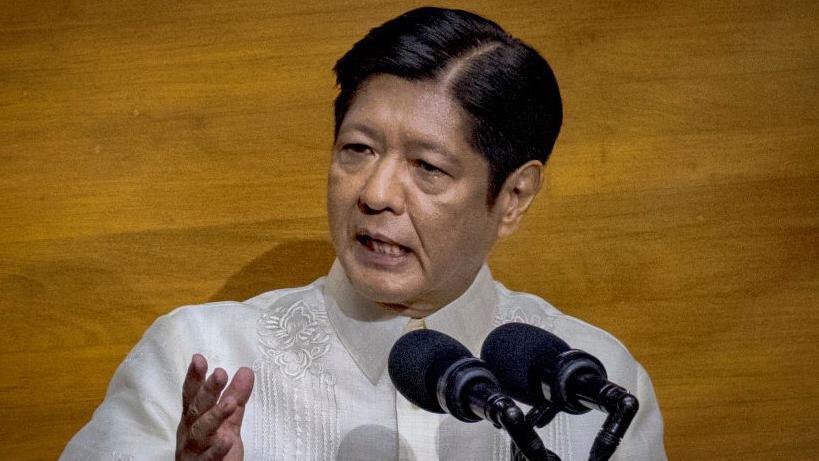Philippines bans online casinos linked to scam centres

- Published
Philippine President Ferdinand Marcos Jr has ordered the shutdown of a sprawling network of online casinos that have been linked to a slew of criminal activities.
Known locally as Pogos, short for Philippine Offshore Gaming Operators, these online casinos largely cater to players in mainland China, where gambling is illegal.
But they have also increasingly been found to have been used as a cover for illicit activities, from telephone scams to human trafficking.
They flourished under Mr Marcos' predecessor, Rodrigo Duterte, who pushed for friendly ties with China during his term.
In his annual address to parliament on Monday, Mr Marcos called for the "desecration of our country [to] stop".
"Disguising as legitimate entities, their operations have ventured into illicit areas furthest from gaming such as financial scamming, money laundering, prostitution, human trafficking, kidnapping, brutal torture, even murder," he said.
On Tuesday, the Philippines' gaming regulator said it would cancel the licenses of Pogos and wind down the sector by the end of the year.
The Pogo industry is made up of over 400 licensed and unlicensed outfits, employing 40,000 people directly and indirectly, according to government estimates.
The industry brings in an estimated 166.5bn pesos ($2.9bn; £2.2bn) of revenue a year, factoring in tax and gaming revenues - lower than its estimated economic costs of 266bn pesos annually.
The BBC has reached out businesses and employees connected to Pogos, but they have declined to comment.
The alleged link between Pogos and criminal rings came under national spotlight recently after a Pogo in a small town was found to have been a front for a scam centre.
The mayor of the town, Alice Guo, is accused of being a spy for China and is currently believed to be in hiding.
Pogos have also been linked to clandestine hospitals, with authorities saying such hospitals were offering their services to those working in such online casinos, offering plastic surgery services to fugitives and scam centre workers to help them evade arrest.
The secret hospitals offering criminals new faces
- Published9 July 2024
Why is this small-town mayor accused of being a Chinese spy?
- Published18 May 2024
Why the Philippines and China are on a collision course
- Published23 October 2023
China's 'creeping occupation'
Since taking over from Mr Duterte, Mr Marcos has reversed Manila's pivot to China and moved closer to the US, the Philippines' historic ally.
Some analysts say the ban could also be viewed by some as another attempt to further distance the Philippines from China.
Both countries are currently locked in a territorial dispute over the South China Sea, with tensions increasingly escalating in recent months.
"Pogos' presence has ceased to be a mere law and order problem. It has been linked to China's creeping 'occupation' of the Philippines for ordinary Filipinos," Jean Encinas-Franco, a professor at the University of the Philippines Diliman told the BBC.
She added that Mr Marcos' move will also be seen as a "rebuke to the open Pogo policy of the previous administration", which could drum up his approval ratings ahead of a crucial mid-term election in 2025.
Locally, the ban has been cheered as being good for business.
Philippines Trade Secretary Alferdo Pascual told local media that it makes the country "more attractive to those who are seeking leisure... because Pogo creates a bad impression, resulting in violence".
George Barcelon, the chairman of the Philippine Chamber of Commerce and Industry, said Pogos is a business "that brings in the kind of people we don’t want. It endangers the moral fibre of our nation".